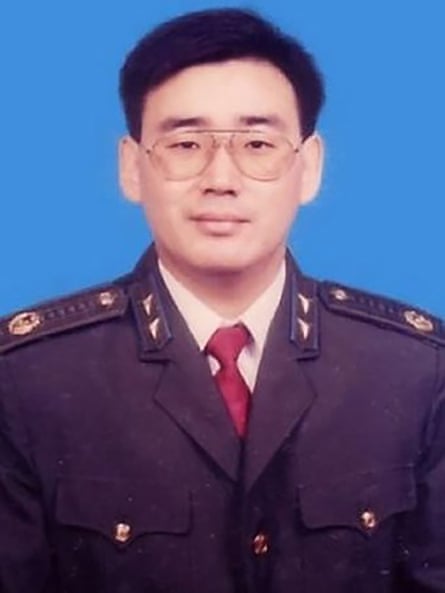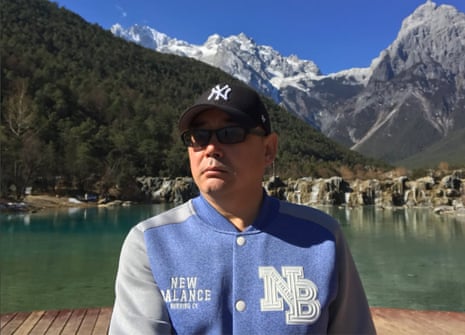In the first chapter of Yang Hengjun’s breathless first spy novel, Fatal Weakness, his protagonist, Yang Wenfeng, is hauled in by police for questioning.
The officers are cliched in their zealotry: “You’ve spent time in America; they say people there only tell the truth when talking to their priests and their psychologists, but lie when talking to police, if they talk at all. I have to warn you, this is China, where the people tell the police and The Party the truth.”
Yang, an Australian novelist and self-declared “democracy pedlar”, has spent seven months imprisoned by China’s Ministry of State Security, an agency for which he once allegedly worked, after being arrested and accused of spying for a foreign state.
The conviction rate for those accused of a crime in China is 99%, in a criminal justice system almost entirely reliant on “confessions” obtained through long, secretive detentions.
Espionage potentially carries the death penalty.
As revealed by the Guardian, Yang has faced intense and protracted interrogations, his hands and feet shackled as he is repeatedly told he faces execution, that his country has abandoned him, his family and friends betrayed him.
In Fatal Weakness, the interrogations continue: “I let my head drop, and for the next week there are interrogations every day … I can’t keep telling them who I think I am, I have to answer each question considering who they think I really am.”

‘The individualistic hero’
Sources who have known Yang across China, Australia and the US insist he is no spy, despite his enduring fascination with a somewhat glamorised, Hollywood ideal of the world of espionage. The Australian government says outright he is not an agent of Canberra, and the Chinese government, too, denies having ever employed him.
More likely, sources say, in the eyes of Beijing, Yang’s reformist pro-democracy writing, his jie di qi style – a colloquialism that literally means “connecting with the earth’s energy” but might best be translated as relatability or the “common touch” – and his influence with significant swathes of the Chinese population, gave him a latent power to agitate for reform.
Yang, whose legal name is Yang Jun, was born in Hubei, central China, in 1965, to a poor family reportedly unremarkable in its orthodoxy. In his grandparents’ era, his family had been one of significant local standing, sources say, but it had fallen a little in recent generations. His father was a school teacher, his mother a nurse. Both are now deceased.
Yang was unmistakably bright and hard-working at school. He won a place at Shanghai’s Fudan University, where he studied political economy.
After graduating, he won a position at the highly competitive Ministry of Foreign Affairs in 1987. Inside China’s sprawling, arcane and strictly hierarchical bureaucracy, Yang seemed to progress well: his work took him across the country and overseas, with steady, if unspectacular, progress and promotion. After two years in Beijing, Yang was posted as section chief of the foreign affairs office of the Hainan provincial government in the South China Sea.
But there are elements of his biography that are imprecise. According to several sources, at this time Yang developed links to the Ministry of State Security, but the nature of those are unclear. A picture taken at the time – speculated to be in 1988 - shows him in the uniform of the MSS, but the Chinese government flatly denies all links.
From 1992 to 1997, Yang worked in Hong Kong, as a department manager in a state-run travel bureau, before, in 1997, taking a post as a senior fellow with US thinktank the Atlantic Council in Washington DC.
Yang moved to Australia in 1999.
Intent on writing a doctoral thesis on the emergence of the blogosphere in China in conflict with government control and censorship, he sought out Dr Feng Chongyi, associate professor in China studies at the University of Technology, Sydney. Feng was a well-known and outspoken critic of the Chinese one-party state, who was himself later detained by the Chinese government.
Feng says neither Yang’s personality nor his ideology are easily typecast.
“You need to differentiate the two parts of Yang Hengjun, one is the orthodox communist bureaucrat, one is the liberal democrat. You need to make the distinction, whether this is his previous life, or his current political opinion.
“But the transition from one to the other was a slow process. He worked in the government from 1987 to 1999. That was 12 years, working as a bureaucrat within the system. During that time, he began as loyal but he grew to hate the corruption, to hate the abuses of the one-party state system.”
Beyond a frustration with the strictures and contradictions of one-party rule, Yang appeared to feel constrained by his role as a public functionary: a limited autonomy subsumed to a precisely dictated greater good.
“He watched a lot of Hollywood movies,” Feng says. “In those American films, the secret agents, they are patriotic figures, but they stand on their own, they work in defiance of the bureaucracy and the establishment, they are individualistic. This was Yang’s model, the individualistic hero.”
The push for reform
Fatal Weakness held to type: its protagonist, Yang Wen Feng, is a Fudan University graduate recruited to work in China’s Ministry of State Security, who eventually becomes a double agent with opaque loyalties in a series of Sino-US spy wars. Through chapters titled “Infiltrating the FBI”, “CIA Spy School” and “Chinese Spies in America”, the story follows the exploits of Yang and his former classmates working in China’s national security agencies, enduring wrongful convictions for crimes against the state, and uncovering US plots to infiltrate China’s intelligence operations.
Yang had designs on fame as a writer. Fatal Weakness was quickly followed by Fatal Weapon and Fatal Assassination, a kind of Chinese Jason Bourne series, using fiction to explore the arcane operations behind China’s Ministry of State Security.
In a 2017 blog post, Yang said his intention was to “set a precedent for the spy fiction genre in China, which remains to this day the only literary work of its kind in the country”.
“I also wanted to demystify the world of spies and secret intelligence, without exposing too much or touching on the political sensitivities of China, the United States, and Taiwan, using literature to inform ordinary readers about the work of intelligence agencies and the lives of intelligence agents.”

Yang imagined his spy novels would be global best-sellers but the reality was bracing. The books tend to cliche – the spies’ world is dangerous yet glamorous, soaked in alcohol and sex, subterfuge and clandestine conversations. The characters are under-developed yet overwritten. The books did not sell well, and a mooted film never got off the ground.
The experience was chastening, friends say, but Yang found his metier, and his audience, in his online political writing.
Yang became a prolific blogger, posting often and writing conversationally, mostly in Chinese. Yang’s posts range from quotidian musings about his life and travel observations, to extensive socio-political commentary on global news. He roamed across China’s political landscape, penning forthright opinions on issues acutely sensitive to Beijing such as the origins and nature of Chinese nationalism, the fate of ethnic minorities in Tibet, and the leadership of Xi Jinping, amassing more than 300,000 followers on his Weibo page and nearly 130,000 on Twitter.
“I believe that democracy, freedom and the rule of law will surely come ... I think the vast majority of my readers understand my blog, can draw hope from it, and be encouraged to live optimistically, continue to pursue and look forward to [that time].”
Yang wrote widely on the weaknesses and contradictions he perceived within China’s one party system, its ideological flaws and self-interested corruption. He argued that only through genuine democratic reform could China comprehensively flourish, and warned against the creeping totalitarianism of the Communist party, its desire to control all aspects of its citizens’ lives and its expansionist ambitions.
Yang’s 2011 arrest
In 2011 Yang was summarily arrested after being followed by three men at Guangzhou airport. He disappeared for a week – fuelling global speculation he had been detained – but re-emerged a week later with an unconvincingexplanation. He told reporters his disappearance was a “misunderstanding” and he had been sick, a claim he has since retracted.
Upon his release, and as Chinese online censorship tightened around those who deviated from the communist party line, Yang took to WeChat, establishing more than 100 channels in 50 cities, with thousands of followers.
He was, in Feng’s words, “a marvellous writer”, who found a natural connection with the Chinese population, not only intellectuals and the well-educated, but also peasants and the country’s stunted grassroots democracy movement. His followers included senior party officials, government spies and frustrated mid-tier bureaucrats caught up in the same system he had once worked under.
“He understood the Chinese people easily and naturally,” Feng says. “He shared their frustrations, and their ambitions.”
Yang assiduously cultivated an aura of mystique and influence within the arcane world of Chinese politics. He flaunted online his 2014 invitation to a banquet in Beijing marking the 65th anniversary of the founding of the People’s Republic of China, an event attended by Xi and former leaders Jiang Zemin and Hu Jintao.
He played up real and created connections to senior political leaders, including Xi, and senior scholars under whom he claimed to have studied at university such as Wang Huning, the Communist party’s chief of ideology. Yang played the game to his advantage, sources say, carving out a space where he could write more freely than others.
While others faced persecution, Yang was allowed to survive online, even thrive, leading to allegations he was an agent of Beijing’s secret services.
Chinese dissident Lebao Wu, who lives in Canberra and knew Yang in Australia, says Yang’s past was difficult to disentangle and his future hard to predict.
“Almost 100% I believe he was a special agent for the MSS. It’s very hard for him to hide his history, there are pictures of him in the uniform of the Chinese state security police, and he talked about his past, without giving away too much, in his writing. After he resettled in Australia, I believe there are two possibilities – one, he was sent by the MSS, he was on a mission from state security authorities, or two, he defected from China to Australia. The Chinese intelligence authorities are incredibly tough on officials who have defected.”
Yang appears to have enjoyed high-level protection for a time, Wu says.
“He went back to China many times, he was invited to important banquets, and held media events broadcast on state media. It appeared he had high-level connections, he knew people in positions of power and he was protected. But now, now it is very hard to know what his future will be.”
Yang addressed the allegations of espionage in an expansive post online, skating at the edges of a denial, but still clearly infatuated with the real or imagined world of spycraft.
In A Letter to Those Looking to Catch a Spy he argued: “I myself have become the target of the ‘spycatcher games’, every month I face a fresh round of allegations of being a spy, it seems many readers would like to see me star in my own erotic thriller.
“The purpose of this post is not to defend myself. Frankly, I really don’t want to reveal whether or not I’m a spy, and for which country I work, there’s nothing wrong with maintaining an air of mystery, especially to those who are already oblivious. My intention is to impart some logic and common sense onto those who spend their days trying to catch spies.”
The return to China
The cultivated air of flamboyant disregard masked Yang’s very real concern for his own safety.
Sources say he was regarded by China’s security agencies as one of a very few democratic activists who had the following and influence to organise social protest on a national scale. Other activists who were arrested said they were inspired by Yang, or admitted they had been reading his posts. Yang’s influence overseas was also seen as intensely problematic.
When you step into that area, you can expect confrontation with the party-state: “Yang knew this,” Feng says.

Yang also broadened his online presence, perhaps out of economic imperative, moving away from political commentary and pouring more energy into an online “daigou” business he had established in America, essentially acting as a personal online shopper for customers seeking goods not available inside China. Yang’s online store sold US-made luxury handbags, vitamins, baby formula and watches.
But still he wrote, penning pieces on reform of the Chinese political system in the final days before he was arrested, arguing that a country where thoughts and speech are suppressed could never be technologically innovative or economically free.
Yang retained close contacts within China who would warn when his writings were sailing too close to the wind for Beijing’s sensibilities. In recent months, connections had told him that conditions had changed in his favour, and that his return to China would not meet with any resistance. Some sources have suggested Yang might have been set up, and his return enticed by former friends and colleagues working for Beijing. Others reportedly warned him that he was on a list to be seized if he set foot on Chinese soil.
He flew into Guangzhou airport from New York on 19 January, accompanied by his wife, Yuan Rui Juan, and daughter. As he stood, awaiting processing in the foreigners’ queue, agents swooped, arresting him. Yuan and his daughter were freed and allowed to join a connecting flight to Shanghai, but Yuan has since been prevented from leaving China.
Yang perhaps knew he would ultimately be arrested. In 2011, having been released from his brief detention, he wrote a letter to be released should he ever disappear again.
“I really believe that in China, spreading [democratic] philosophy is a vital task,” he wrote.
He said those advocating change should not “put yourselves at risk over my situation”, but also “maintain belief in China’s democratic future, and … use all your means to push China’s democratic development to happen sooner”.
“If I can come out, I will continue my work,” he wrote. “If I cannot come out or disappear again, remember my articles and let your children read them.”
